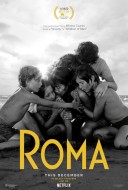Roma Movie Review
 |
Roma
Theatrical Release: November 21, 2018 / Running Time: 135 Minutes / Rating: R Writer/Director: Alfonso Cuarón Cast: Yalitza Aparicio (Cleo), Marina de Tavira (Sra. Sofía), Jorge Antonio Guerrero (Fermín), Diego Cortina Autrey (Toño), Carlos Peralta (Paco), Daniela Demesa (Sofi), Nancy García (Adela), Verónica García (Sra. Teresa), Andy Cortés (Ignacio), Fernando Grediaga (Sr. Antonio) |
The career of Alfonso Cuarón has unfolded in an unusual and unpredictable manner. In the early 1980s, then in his early 20s, Cuarón began directing shorts and television series in his native Mexico. For his first American film as director, Three years later, Cuarón returned to Mexico to make Y Tu Mamá También, a road trip dramedy that drew rave reviews and an Oscar nomination for the original screenplay he wrote with his brother Carlos. Based on his experiences, you might have expected the filmmaker to continue to make movies in his native country and tongue, but when an offer came for him to direct the third Harry Potter movie, he took the helm from Chris Columbus and gave us what in my estimation remains the creative apex of that epic 8-film fantasy franchise. Despite the warm reception from critics and moviegoers, Prisoner of Azkaban became the lowest-grossing entry in the series. Cuarón didn't suddenly want to stick in the realm of big-budget tentpoles. His next film was Children of Men, a $70 million dystopian British-American thriller that underperformed commercially upon its Christmas 2006 opening but thoroughly won over critics and earned Cuarón his second Oscar nomination, this time for adapted screenplay.
If you thought that film would relgate its maker to arthouse fare, you were wrong again. It took seven years for Cuarón to follow up Children and when he did, it was with Gravity, a technically dazzling thrill ride starring Sandra Bullock as an astronaut struggling to stay alive in space. The $100 million production nearly put up Harry Potter-type numbers for Warner Bros. Pictures and it was exalted by critics on its way to seven Academy Awards, including Cuarón's first for Best Director.
After another hiatus, Cuarón finally follows up that arresting achievement, undoubtedly the runner-up for 2013's Best Picture to 12 Years a Slave, with something -- you guessed it -- completely different. Roma returns Cuarón to the Oscar conversation. It's pretty much guaranteed to earn a slew of nominations for Cuarón, who wrote, directed, produced, edited, and photographed this semi-autobiographical tale. But that and the facts that it is a technically stunning and dramatically powerful work of art are about all it has in common with the director's previous film.
Roma is set in Mexico City at the end of 1970 and beginning of 1971. It focuses on a wealthy Mexican family, primarily from the perspective of Cleo (Yalitza Aparicio), its young, quiet live-in housekeeper. Cuarón gets your attention with the opening shot, in which we remain fixated on what we eventually come to identify as the garage/entryway for the family. Cleo is charged with cleaning that area and other places of the picturesque urban residence. She also has to take care of four young children, assisting the family matriarch Sofia (Marina de Tavira), while her husband Antonio (Fernando Grediaga), a cultured and affluent doctor is away for weeks on end on unspecified business.
The kids love Cleo and so does Sofia, even if the maid is an easy target for when the kids test Mom's patience. Cleo seems to love her job also and living in the family's home in a room she shares with another maid and friend, Adela (Nancy García). On an afternoon off, Cleo and Adela go on what is to be a double date at the movies. Cleo seems to have the more attractive of the two in Fermín (Jorge Antonio Guerrero), but we slowly come to learn he's a real piece of work. For a moment, though, it seems as if his fully nude martial arts display with a shower rod as his sword is really winning Cleo over.
Cleo comes to suspect she's pregnant and upon sharing this news with Fermín at a showing of the French war comedy La Grande Vadrouille, he proceeds to almost immediately ghost her. Though she fears her pregnancy will get her fired, Cleo finds Sofia to be remarkably supportive, driving her to the doctor and severely banging up her husband's prized car in the process.
The more synopsis I try to write, the more I realize how unable to do this film justice with a blow by blow account. This is less a story with a beginning, middle, and end than it is a slice of life. And what an engrossing slice of life it is. On the one hand, Roma seems to effortlessly earn your investment in its world. Filmed in Mexico City, it does a wondrous job of recreating a time and with the kind of personal detail you couldn't invent. Cuarón turned nine in the period depicted and no doubt he can associate with the kids, who surprisingly never really come into focus individually here. You might assume that would be a drawback, but Roma is not about the kids. It's about Cleo, her calling, and, secondarily, Sofia's marriage, which is somewhat secretly falling apart off-camera.
I can't think of another film whose rewarding nature is so difficult to explain. The closest I can come up with Richard Linklater's Before movies, which are not like this at all but whose magic similarly defies simple synopsis.
Roma is atmospheric, to be sure. We become familiar with the family home and with the friends' hacienda where the family spends a pretty unforgettable New Year's. We can appreciate the country sights and sounds that remind Cleo of the village where she's from. What narrative there is pivots on the Corpus Christi massacre, which saw Mexican soldiers and student demonstrators clashing.
But nothing I can tell you about the film can convey how beautiful and heartbreaking it is. That is achieved with great effort and even greater artistry from Cuarón, who dazzles both of our available senses for just over two hours. I guess at this point, I should tell you that Roma is black and white and predominantly in Spanish (with a little bit of Mixtec, distinguished by bracketed subtitles). Both of those facts may be off-putting for certain viewers, but they are essential to Roma's infinite charm and power. Roma gets more out of its cinematography than most films -- with or without a full color palette -- ever have. The enveloping sound is also unusually immersive for what is largely an intimate character study.
The previous paragraph probably makes it clear that Roma is bound to contend in at least three of the Oscar categories that Gravity won. As Mexico's official submission, a Foreign Language Film win seems all but in the bag as well. But the transcendent Roma is almost certain to also become one of the rare foreign films that vies for major honors as well. No foreign language film has ever won Best Picture before and only eight have ever been nominated. If the language and black & white weren't enough to give some pause (and you'll recall that the mostly silent black and white The Artist won Best Picture just seven years ago), there's one other major hurdle for Roma to clear to make history. That's because this is a Netflix movie. The studio is going all in here, though. To date, Netflix's success at the Oscars has been limited to documentary shorts and features. Exhibitors have bristled at the service's approach of releasing films on their streaming service the same day as theaters. It's an affront to cinema, or something like that. But they've committed to putting Roma in theaters, where it absolutely deserves to be seen. After making the festival circuit (Venice, Telluride, Toronto) at the end of summer, the film opened in a handful of New York and Los Angeles theaters on Thanksgiving Eve and expands to more today, a week before it's available to stream.
While it's a legitimate concern that Netflix could be altering the theatrical moviegoing experience, it's equally true that the company is now making great films that none of the major studios themselves would. To earn back this film's $15 million production budget would be a tall order, even with the resounding art house buzz this will generate. But Netflix makes around a billion dollars every month from subscription fees and if they are going to use some of that money to fund creative works from the likes of Cuarón, the Coen brothers, Scorsese, Soderbergh, Baumbach, Greengrass, and so on, while also making a greater effort to get the films shown in theaters, on what grounds can cinema lovers truly object?
I expect that I'll soon be able to review a Netflix movie without having to discuss Netflix itself. The company is unquestionably revolutionizing the business in a remarkably short amount of time. But making films like Roma seems more important than anything else really. The art form itself has evolved constantly. Distribution methods and trends are always changing. But as long as there are great movies like this one being made, everything will be fine. Incidentally, that happens to be dominant message to take from Roma, which stands as the best film I've seen this year.
|
Related Reviews:
DVDizzy.com | DVD and Blu-ray Reviews | New and Upcoming DVD & Blu-ray Schedule | Upcoming Cover Art | Search This Site
DVDizzy.com Top Stories:
Directed by Alfonso Cuaron: Gravity • Y Tu Mama Tambien • Harry Potter and the Prisoner of Azkaban
2018 Award Contenders: The Favourite • Black Klansman • First Man • Black Panther
Netflix Originals: The Ballad of Buster Scruggs • Bird Box • 22 July
Text copyright 2018 DVDizzy.com. Images copyright 2018 Netflix, Participant Media, and Esperanto Filmoj.
Unauthorized reproduction prohibited.


